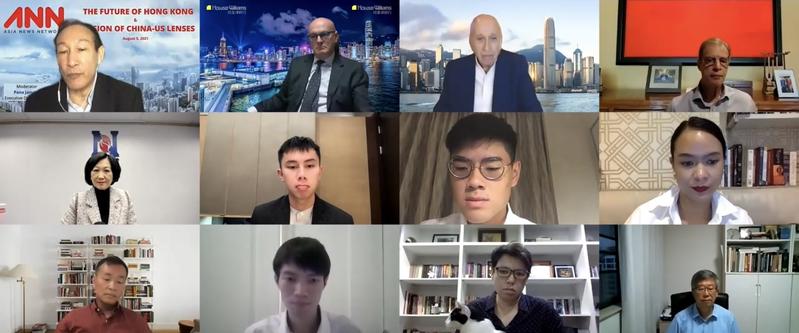Is Hong Kong just a pawn in US-China rivalry, Pana Janviroj reports in the final of a two-part series.
 The screenshot shows the participants of last week's webinar on “The Future of Hong Kong & Division of China-US Lenses” organized by Asia News Network. (PHOTO PROVIDED TO CHINA DAILY)
The screenshot shows the participants of last week's webinar on “The Future of Hong Kong & Division of China-US Lenses” organized by Asia News Network. (PHOTO PROVIDED TO CHINA DAILY)
Hong Kong – The rivalry between the United States and China is unlikely to undermine Hong Kong’s position as the world’s leading financial center in their high-stakes jostling for power and influence in the region, according to leading academics from both countries.
Richard Weixing Hu, the University of Macau’s Dean of Faculty of Social Sciences, said that while the stakes are very high for both countries, it is of "vital national interest for China not to let the 'one country, two systems' arrangement fail".
William Overholt from Harvard University’s Kennedy School noted that Hong Kong remains one of the world’s premier financial centers and is likely to grow even stronger with further opening up of the Chinese financial sector and, ironically, by US pressure on Chinese companies listed in New York
William Overholt from Harvard University’s Kennedy School, suggested that while the US policy on Hong Kong, which has included sanctions, is designed to “express disapproval” of the alleged breaches of the city’s Basic Law, it has “no desire to hurt” the people of Hong Kong.
Overholt spent several years working in Hong Kong and was very involved in the island's transition.
Both academics were optimistic on the future of Hong Kong’s economic and financial sectors.
They were speaking at a webinar on “The Future of Hong Kong & Division of China-US lenses” organized by Asia News Network, an alliance of 23 media organization in 20 Asian countries and regions.
Enze Han from the University of Hong Kong’s Department of Politics and Administration said that given the 2019 protests didn’t achieve “anything”, and with the National Security Law for Hong Kong in place, it would be better for Hong Kong to keep a low profile and stay out of the disputes between the two superpowers.
ALSO READ: National Security Law ushers in new future for Hong Kong
Hu reiterated that China has a strong economic stake in the Hong Kong Special Administrative Region and to see its successful integration into the (Guangdong-Hong Kong-Macao) Greater Bay Area.
He said the US has commercial interests in Hong Kong and wants to use it as an issue to check on and as a bargaining chip to put pressure on Beijing.
Overholt said there was misconception in the US and Western nations, and they were underestimating the public support for the crackdown against the rioters in 2019.
“The majority of Hong Kong supported peaceful protests but the violence by a minority was terrible and there was tremendous anger against violent rioters supporting Hong Kong’s independence and waving the British flag and destroying businesses.”
He noted that Hong Kong remains one of the world’s premier financial centers and is likely to grow even stronger with further opening up of the Chinese financial sector and, ironically, by US pressure on Chinese companies listed in New York. If China can succeed in breaking up some of Hong Kong’s oligopolies and monopolies, Hong Kong’s economy could become much more competitive than it is today, he said.
Hu, meanwhile, lamented that US-China relations were likely to worsen before it got better, as each side was driven by domestic political forces. In the US, it is the Congress and interest groups, in China, it is the rise of nationalism.
“Hong Kong is a very hot issue. Washington will continue to use it to demonize China and try to pressure Beijing and showcase the latter’s behavior against the rule-based international order.”
READ MORE: Qin, Sherman agree to maintain close dialogue
He said Beijing has become very defensive and is trying to defend its commitment to the “one country, two systems” arrangement. With the National Security Law, it is trying to change things on the ground, and calmness has returned to the city. “But it will take a long time for the return of hearts. Whether young people will choose to identify with China, it will take time.”
He warned the US would only hurt itself by increasing sanctions, while any effort to delink Hong Kong from the US or from the HK dollar would also end up hurting the US.
The webinar was co-moderated by Pana Janviroj and Panrawee Penny Meesupya from Bangkok.


